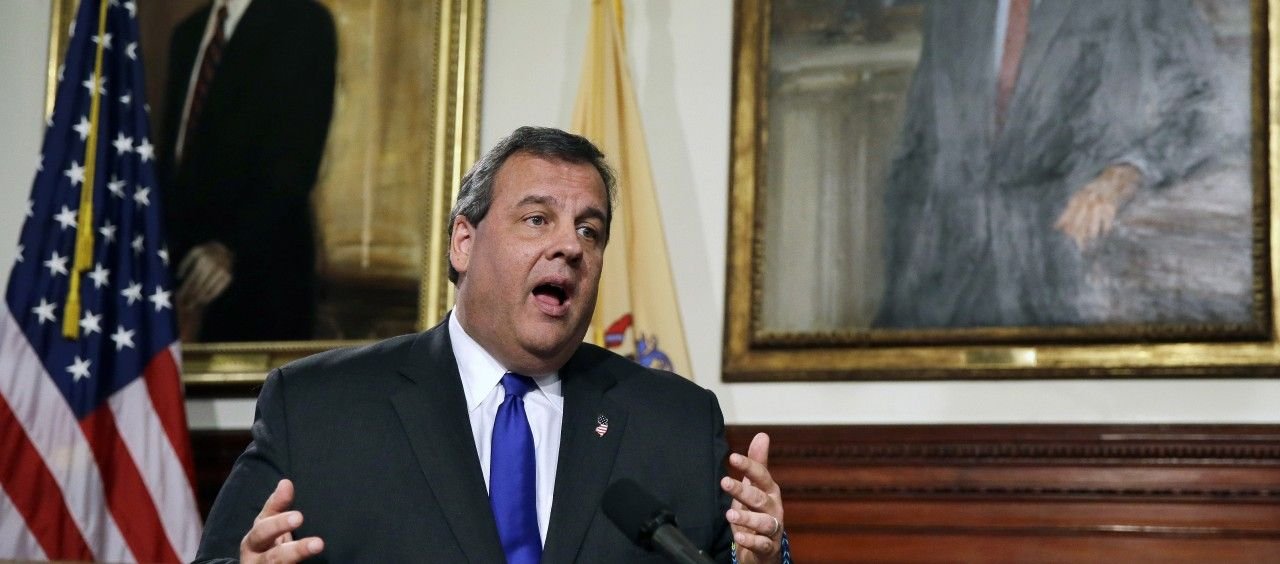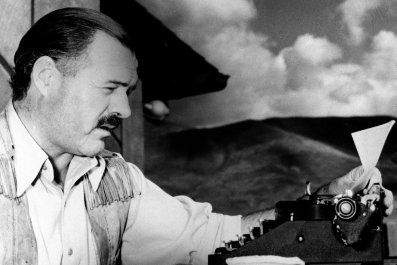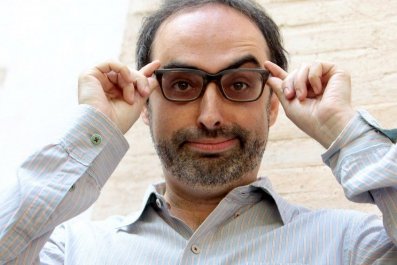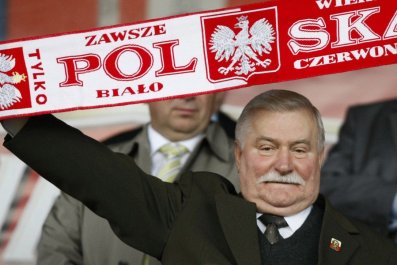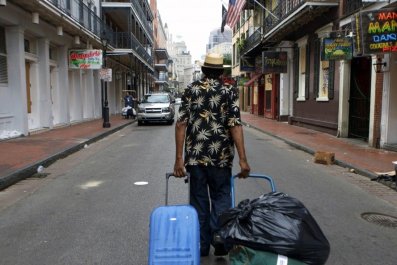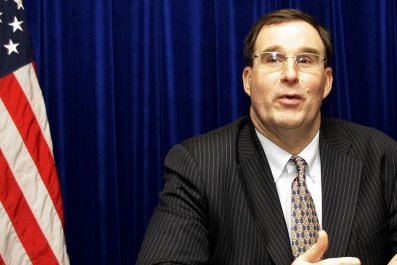Fighting for his political life on Thursday, New Jersey Governor Chris Christie offered up a line he may ultimately regret: "I am not a bully."
It immediately evoked Richard Nixon's infamous flat denial of his criminality during the Watergate scandal. "I am not a crook," Nixon said. The line is memorable because, it turned out, he was a crook.
Whether or not Christie is ultimately found to be involved in the scandal, there is little doubt that Christie is a bully.
Emails and text messages revealed that Christie's top aides and appointees created days of interminable traffic jams in Fort Lee, N.J., as political retribution against Mark Sokolich, the town's Democratic mayor, who had failed to back Christie's re-election. Watergate it's not. But the Nixon comparisons are unavoidable.
"I recalled how similar the governor's conduct during the re-election campaign was to that of President Nixon during his victorious re-election campaign in 1972," former Republican state Assemblyman Richard Merkt, a former Christie ally turned primary rival in 2009, told New York magazine.
Merkt pointed out that Christie, like Nixon, was ahead in the polls by about 30 points when his office asked the Port Authority of New York and New Jersey to shut down two access lanes onto the George Washington Bridge. "[Nixon] had no need to engage in an abuse of power to win re-election, and, in fact, he won by a landslide. But Nixon just couldn't help himself; he did it anyway; he eventually got caught, and it cost him his office and political career," he said.
Until now, Christie was considered a frontrunner for the Republican presidential nomination in 2016. Setting aside the legal landslide about to come down on Christie's administration, including an urgent investigation by the U.S. attorney for New Jersey, the question is whether he is tarred with the bully image forever and whether it will sink him if he persists in his run for the White House.
Christie's famously abrasive manner has always been a double-edged sword for the governor. At its best it gives him a no-nonsense, people-first persona; at its worst, it is stereotypical New Jersey thuggery.
The first may appeal to some hard-nosed New Jersey Republican primary voters - especially if used to attack Democrats. But the second would alienate early primary voters in Iowa or South Carolina who would be skeptical about electing a New Jersey bully president. To be a strong executive is a necessary quality in a president; to be a bully is a deal breaker.
"An early primary opponent can really use this in a pejorative way that facilitates rural voters buying into this stereotype about New Jersey in particular and about New Jersey politicians, and that does not help the governor," said Brigid Harrison, a professor of politics and law at Montclair State University and a politics expert. "That kind of distances him from the voters whose support he will need."
Despite Christie's protestations, the governor has a reputation for political retribution, and Bridgegate lets the rest of the country know the side of Christie that political operatives in Trenton know too well. Why else would Democrats immediately jump to the conclusion that a city's traffic problems were a political revenge plot, as text messages released Wednesday indicate?
"Someone needs to tell me that the recent traffic debacle was not punitive in nature," Sokolich said in a September text to Bill Baroni, one of two Christie allies at the Port Authority who has since resigned. "The last four reporters who contacted me suggest that the people they are speaking with absolutely believe it to be punishment."
"People make presumptions based on the experiences that they have," Representative Debbie Wasserman Schultz, D-Florida, and the chairwoman of the Democratic National Committee explained on MSNBC Wednesday night. And this is what people have come to expect of the Christie administration. And it's the image now reaching the rest of the country.
On Christmas Day, The New York Times ran a front-page story on the many New Jersey officials who believed they had experienced Christie's retribution firsthand. "Stories Add Up as Bully Image Trails Christie," the headline read.
Barbara Buono, the Democrat who lost to Christie in November, said the latest revelations are "standard procedure" with Christie. During her campaign, Buono said donors hesitated to give more than $300, the legal limit after which the donation must be reported under New Jersey law, lest the Christie administration find out.
"I had people on many occasions express that they were afraid to show up on these public reports that they had contributed to my campaign because they thought that there would be retributions," Buono said.
Buono, a state senator whose term will expire later this month, did not mince words in discussing the way Christie does business in Trenton. "Nobody sneezes without asking Chris Christie's permission," she said. "It reveals a culture of arrogance that leads to these very dangerous abuses of authority."
The portrayal of Christie as a bully who stoops to vindictive petty politics is one both Republicans and Democrats will exploit if Christie runs for president. "He's been able to get away with being a populist, good-old-boy governor of New Jersey," said Adrienne Elrod, a spokesman for the group Correct the Record, dedicated to defending Hillary Clinton ahead of her potential run in 2016. "This screams sleazy, smarmy politics."
As a governor, Christie has, on the one hand, used every tool at his disposal to wield power in his state, while on the other he has received relatively little pushback from the Democrats in Trenton. The result is an active governor who can throw political punches and get away with them.
"This is a governor who from the outset has exercised power in a very careful and methodical and I would argue Machiavellian [way]," Harrison said. "He has exercised power powerfully."
It's why Christie's proclamations of innocence in Bridgegate are not convincing. It doesn't help that minutes after Christie's press conference on Thursday, David Wildstein, one of the now-resigned officials involved in the scandal, pled the Fifth so he did not incriminate himself in response to questions at a state assembly hearing into the affair.
One example of Christie's dictatorial style was his decision to veto the minutes of the independent boards and authorities, a power that allows the governor to cancel the undertakings of entities like the Schools Development Authority or the New Jersey Turnpike Authority. It's a power used so rarely that many in New Jersey politics didn't even know it existed.
In his first 13 months in office, Christie wielded this power 19 times. "We were all like, 'What the heck, can he do this?' And it turns out that he had that process vetted and in fact he could do that and in fact he did do that," Harrison said.
Nor does the self-styled image of Christie as a hands-on governor who rolls his sleeves up and takes part in every decision however small does not fit with his current insistence that some of his closest aides oversaw the bridge plot without telling him. These top aides include Wildstein, Bridget Anne Kelly, chief spokesman Michael Drewniak and reelection campaign manager Bill Stepien, whom Christie on Tuesday nominated to run the New Jersey state GOP.
"We know that how he has exercised authority in the past has been rather heavy-handed," Harrison said. "That raises more questions than if this were a hands-off governor, if this were a governor who delegated consistently to staff, who kept decision making at bay and relied on senior staff members. There are of course governors who do that. This is not one of those governors."
If it turns out Christie was directly involved in closing the access lanes in Fort Lee, the bully image will be the least of his worries. If he is able to maintain his innocence, it won't be his only image problem.
"The damaging thing is that he looks like an imbecile," said Democratic strategist Hank Sheinkopf. "It has everything to do with not controlling your staff."
"This may well be the end of his national ambitions," he continued. "But one thing is sure: If he stays in New Jersey, all the people running around and banging him around today are going to be paying for it for the next four years. He will make their lives miserable."


